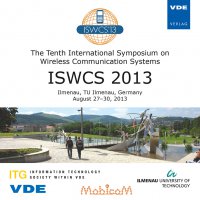Soft Binary BCH Decoder Based on Statistical Selection of Test Patterns
Conference: ISWCS 2013 - The Tenth International Symposium on Wireless Communication Systems
08/27/2013 - 08/30/2013 at Ilmenau, Deutschland
Proceedings: ISWCS 2013
Pages: 5Language: englishTyp: PDF
Personal VDE Members are entitled to a 10% discount on this title
Authors:
Bas, J. (Centre Tecnològic de Telecomunicacions de Catalunya (CTTC), Av. Karl Friedrich Gauss, s/n, Parc Tecnològic de la Mediterrània, Castelldefels, Barcelona)
Abstract:
Binary Bose-Chaudhuri-Hocquenhem (BCH) codes are used to protect a large variety of signals. From sensors of ehealth applications (e.g. IEEE 802.15.6) to satellite communications (e.g. DVB-S2). This fact is due to BCH codes offer a high tradeoff between reliability and complexity. Initially, binary BCH codes were devised for being decoded by means of hard-decision decoding strategies. However, it is also possible to decode them by means soft-decisions, although in this case its high complexity limits their final implementation [1]. The reason is that soft BCH decoders create a sequence of possible test patterns based on Log Likelihood Ratios (LLR) that increases their computational load. The higher the number of test patterns the better the performance of the soft-decoder, but also its complexity grows. This number of test patterns is conditioned by the lack of knowledge of the actual number of errors in the codeword. So, we propose estimate this number of errors in a codeword by assuming that we know the channel statistics and the Eb / N0. In this way, it is possible to compute the regions of Eb / N0 in which the probability of having a concrete number of errors in the codeword is maxima. As a result it is possible to establish an order for testing the test patterns in the soft-decoder, which reduces its final decoding time.


